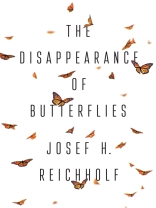In the last fifty years our butterfly populations have declined by more than eighty per cent and butterflies are now facing the very real prospect of extinction. It is hard to remember the time when fields and meadows were full of these beautiful, delicate creatures – today we rarely catch a glimpse of the Wild Cherry Sphinx moths, Duke of Burgundy or the even once common Small Tortoiseshell butterflies. The High Brown Fritillary butterfly and the Stout Dart Moth have virtually disappeared.
The eminent entomologist and award-winning author Josef H. Reichholf began studying butterflies in the late 1950s. He brings a lifetime of scientific experience and expertise to bear on one of the great environmental catastrophes of our time. He takes us on a journey into the wonderful world of butterflies – from the small nymphs that emerge from lakes in air bubbles to the trusting purple emperors drunk on toad poison – and immerses us in a world that we are in danger of losing forever. Step by step he explains the science behind this impending ecological disaster, and shows how it is linked to pesticides, over-fertilization and the intensive farming practices of the agribusiness.
His book is a passionate plea for biodiversity and the protection of butterflies.
表中的内容
Foreword
Acknowledgements
Introduction
Part I: The Biodiversity of Lepidoptera
A Review of 50 Years of Butterfly and Moth Research
Insects fly towards UV light
Urban Lepidoptera: more common than expected
Death’s head hawk-moth: a guest that can barely live with us anymore
The Fascinating Life of Aquatic Moths
Evenings at the pond
The hidden lives of the little nymphs
How the caterpillar breathes under water
Up and away in an air balloon
The advantages of living in water
A place to live or an ‘ecological niche’
The destruction of the biotopes of the little nymphs
The Benefits of Being Attracted to Light
Like moths to a flame
The red blindness of butterflies
The Strange Behaviour of the Purple Emperor
Butterflies on drugs
Psychedelics in the insect kingdom
The Nettle-feeding Lepidoptera: An Instructive Community
Nettles: indicators of overfertilization
Nettles escape defoliation
Maize: damaged beyond repair
Cabbage whites: parasites and protection
The mass flight of the map butterfly: singularities in the realm of the butterflies
Does climate change affect the seasonal morphs of the map butterfly?
Nature is too diverse for simple generalizations
The Great Migrations of the Butterflies
The migratory flights of the painted ladies
Small tortoiseshells as travellers
Butterfly invasions
Poisonous Butterflies and Moths: From the Cabbage White to the Six-spot Burnet
Cabbage whites on the Dalmatian coast
Whenever it rains in the desert …
Which factors affect the reproduction of butterflies, and when?
Useful models
The need to go slow
Poison in the body
The Secret Life of Small Ermine Moths
The bird-cherry, a tree of the riparian woods
Toxins in bird-cherries
The life history of the caterpillars of the ermine moth
Helpful hungry caterpillars
Between parasitism and population explosion
Longer-term population cycles
Coppice management and its consequences
Generations and multiyear cycles of ermine moths
Parasitoids on other ermine moths
The lifecycles of butterflies and moths
Hardy Winter Moths
Life at the edge of winter
The mastery of seasonal niches
Why female winter moths do not need wings
Deforestation, poison and the decline of the codling moth and the winter moth
The common quaker moth in early spring
Brimstones: The First Spring Butterflies
Butterfly attacks
The problem with early flight
Müllerian mimicry
The critical factor of spring weather
‘Balance’ in nature
Part II: The Disappearance of Lepidoptera
Assessing the Abundance and Occurrence of Butterflies: A Major Challenge
Starting with 1, 000 watts
How to successfully attract moths to light
Change and continuity
All praise to those who helped us with identification problems
Butterfly and Moth Names
The Decline of Moths and Butterflies
The village outskirts and the open fields
Findings in the riparian woods
The findings from Munich
The decline in species diversity
Warm summers and what they mean for the moths and butterflies
The Metropolis: The End of Nature or Salvation of Species Diversity?
The advantage of structure
Monocultures produce pests
Cities as islands of warmth
Overfertilized, poisoned land
Nature-friendly cities
The Inhospitality of the Countryside
From idyll to slurry
Monocultures and changes to the ground-level microclimate
The cooling of fields and forests
Increased growth reduces the abundance of moths and butterflies in the riparian woods
Boundary ridges in the fields and meadows: a supportive network
‘Infilling’ and ‘compensating areas’
The ‘nutritional condition’ of the landscape
The disappearance of the cockchafers
The turning point for our farmers: the 1970s
The Krefeld Study
A subsidy system without an exit mechanism
Nature conservation and nature enthusiasts
The Devastating Effect of Communal Maintenance Measures
The End of the Night: The Role of Light Pollution
Summary: A Cluster of Factors
The Disappearance of Moths and Butterflies and Its Consequences
What We Can Do about the Disappearance of Moths and butterflies
The Beauty of Moths and Butterflies
Two Findings in Place of an Epilogue
Select Bibliography
Index
关于作者
Josef Reichholf is an environmental biologist and author who has twice received the German Science Book of the Year prize.












